2012年普通高校招生考试湖北a卷英语(word)
2012年湖北省高考英语试题A卷及答案——香格里拉
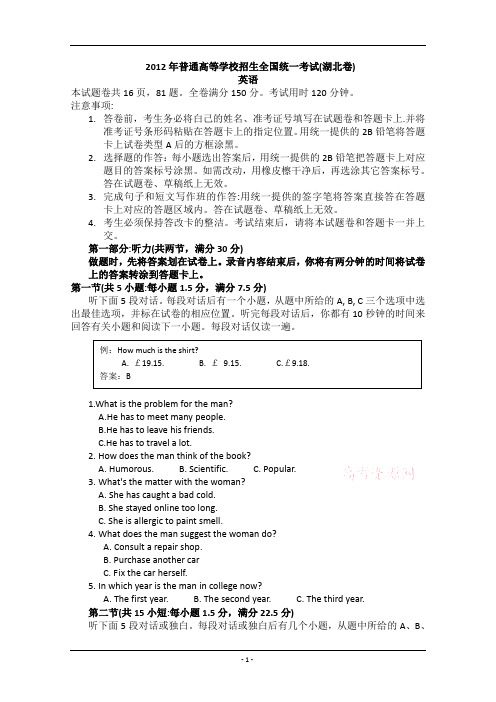
2012年普通高等学校招生全国统一考试(湖北卷)英语本试题卷共16页,81题。
全卷满分150分。
考试用时120分钟。
注意事项:1. 答卷前,考生务必将白己的姓名、准考证号填写在试题卷和答题卡上.并将准考证号条形码粘贴在答题卡上的指定位置。
用统一提供的2B 铅笔将答题卡上试卷类型A 后的方框涂黑。
2. 选择题的作答:每小题选出答案后,用统一提供的2B 铅笔把答题卡上对应题目的答案标号涂黑。
如需改动,用橡皮檫干净后,再选涂其它答案标号。
答在试题卷、草稿纸上无效。
3. 完成句子和短文写作班的作答:用统一提供的签字笔将答案直接答在答题卡上对应的答题区域内。
答在试题卷、草稿纸上无效。
4. 考生必须保持答改卡的整洁。
考试结束后,请将本试题卷和答题卡一并上交。
第一部分:听力(共两节,满分30分)做题时,先将答案划在试卷上。
录音内容结束后,你将有两分钟的时间将试卷上的答案转涂到答题卡上。
第一节(共5小题:每小题1.5分,满分7.5分)听下面5段对话。
每段对话后有一个小题,从题中所给的A, B, C 三个选项中选出最佳选项,并标在试卷的相应位置。
听完每段对话后,你都有10秒钟的时间来回答有关小题和阅读下一小题。
每段对话仅读一遍。
1.What is the problem for the man?A.He has to meet many people.B.He has to leave his friends.C.He has to travel a lot.2. How does the man think of the book?A. Humorous.B. Scientific.C. Popular.3. What's the matter with the woman?A. She has caught a bad cold.B. She stayed online too long.C. She is allergic to paint smell.4. What does the man suggest the woman do?A. Consult a repair shop.B. Purchase another carC. Fix the car herself.5. In which year is the man in college now?A. The first year.B. The second year.C. The third year.第二节(共15小短:每小题1.5分,满分22.5分)听下面5段对话或独白。
2012年普通高等学校招生全国统一考试(湖北卷)

绝密★启用前试卷类型:B 2012年普通高等学校招生全国统一考试(湖北卷)语文本试卷共六大题,8页。
总分150分,考试用时150分钟。
注意事项:1.答卷前,考生务必用2B铅笔在“考生号”处填涂考生号。
用黑色字迹的签字笔将自己的姓名和考号填写在答题卡上。
用2B铅笔将试卷类型(B)填涂在答题卡相应位置上。
将条形码横贴在答题卡右上角“条形码粘贴处”。
2.选择题每小题选出答案后,用2B铅笔把答题卡上对应题目选项的答案信息点涂黑;如需改动,用橡皮擦干净后,再选涂其他答案。
答案不能答在试卷上。
3.非选择题必须用0.5毫米黑色字迹的签字笔作答,答案必须写在答题卡各题目指定区域内的相应位置上;如需改动,先划掉原来的答案,然后再写上新的答案;不准使用铅笔和涂改液。
不按以上要求作答的答案无效。
4.作答选做题时,请先用2B铅笔填涂选做题的题组号对应的信息点,再作答。
漏涂、错涂、多涂的,答案无效。
5.考生必须保持答题卡的整洁。
考试结束后,将试卷和答题卡一并交回。
一、语文基础知识(共15分,共5小题,每小题3分)1.下列各组词语中加点的字,读音全都相同的一组是A.灵.秀磷.光玲.珑剔透聆.听教诲B.诞.生旦.角淡.泊明志担.当重任C.宿.营诉.说夙.兴夜寐素.昧平生D.咨.询滋.生芝.兰之室孜.孜不倦【答案】C2.下列各组词语中,没有错别字的一组是A.羞涩袅娜歌声缈茫荷塘薄雾B.霜天廖廓峥嵘岁月浪遏飞舟C.细腻箫索落蕊残叶秋蝉嘶叫D.嫩黄葱茏婆娑起舞繁茂苍翠【答案】D3.依次填入下列横线处的词语,最恰当的是说到底,世上风景闲流水,端的还是要人慢下来。
中国这如许的城市中,最是江城得了个中,且将它地挥洒出来。
这江城街头巷尾、湖畔公园里数不胜数的茶馆、茶铺,一个人在清晨里不慌不忙的起来,到茶馆里,一坐就是一天,那叫一个悠闲!A.趣味痛痛快快当是遛B.滋味淋漓尽致便是踱C.意味兴致勃勃自是逛D.韵味尽情尽兴恰是晃【答案】B4.下列各项中,没有语病的是A.坐上画舫游清江,如行画卷之中,江水清澈,绿树蓊郁,自然与人,和谐相依,随风生长,好一派如诗如画的风光!B.游览三峡大瀑布时,我们从倾泻而下的水帘中狂奔而过,尖叫声、嬉笑声响成一片,那真是充满刺激的难忘体验!C.当今已经很少有人会像以前那样的闲情逸致,拿出一本小说,从头到尾地阅读一遍,欣赏其委婉动人的故事。
英语_2012年湖北省高考英语试卷_复习
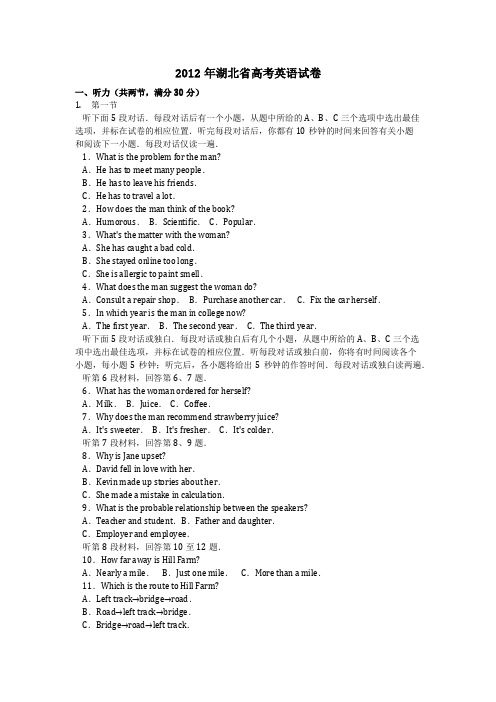
2012年湖北省高考英语试卷一、听力(共两节,满分30分)1. 第一节听下面5段对话.每段对话后有一个小题,从题中所给的A、B、C三个选项中选出最佳选项,并标在试卷的相应位置.听完每段对话后,你都有10秒钟的时间来回答有关小题和阅读下一小题.每段对话仅读一遍.1.What is the problem for the man?A.He has to meet many people.B.He has to leave his friends.C.He has to travel a lot.2.How does the man think of the book?A.Humorous. B.Scientific. C.Popular.3.What's the matter with the woman?A.She has caught a bad cold.B.She stayed online too long.C.She is allergic to paint smell.4.What does the man suggest the woman do?A.Consult a repair shop. B.Purchase another car. C.Fix the car herself.5.In which year is the man in college now?A.The first year. B.The second year. C.The third year.听下面5段对话或独白.每段对话或独白后有几个小题,从题中所给的A、B、C三个选项中选出最佳选项,并标在试卷的相应位置.听每段对话或独白前,你将有时间阅读各个小题,每小题5秒钟;听完后,各小题将给出5秒钟的作答时间.每段对话或独白读两遍.听第6段材料,回答第6、7题.6.What has the woman ordered for herself?A.Milk. B.Juice. C.Coffee.7.Why does the man recommend strawberry juice?A.It's sweeter. B.It's fresher. C.It's colder.听第7段材料,回答第8、9题.8.Why is Jane upset?A.David fell in love with her.B.Kevin made up stories about her.C.She made a mistake in calculation.9.What is the probable relationship between the speakers?A.Teacher and student.B.Father and daughter.C.Employer and employee.听第8段材料,回答第10至12题.10.How far away is Hill Farm?A.Nearly a mile. B.Just one mile. C.More than a mile.11.Which is the route to Hill Farm?A.Left track→bridge→road.B.Road→left track→bridge.C.Bridge→road→left track.12.What would the man like the woman to do towards the end of the conversation?A.Give him a ride.B.Repeat what she said.C.Walk him to Hill Farm.听第9段材料,回答第13至16题.13.What is the woman doing?A.Hosting a TV show.B.Giving a lecture on poetry.C.Conducting a radio debate.14.How did the man's mother contribute to his success in poetry?A.She sent him to poetry classes.B.She taught him to write business plans.C.She asked him to read from early childhood.15.What does the man find most difficult in writing?A.Choosing the right words.B.Describing real experiences.C.Getting an appropriate opportunity.16.What does the man say about his own writing?A.Creative. B.Successful. C.Encouraging.听第10段材料,回答第17至20题.17.How do students enter the library?A.With a library account. B.With a student card. C.With a password.18.What is the maximum number of books current students can borrow?A.12.B.11.C.9.19.What kind of books have to be returned within one week?A.Books borrowed by local residents.B.Books liked by a lot of people.C.Books published recently.20.What will the speaker do next?A.Tell the students where to get bottled water.B.Take the students on a campus tour.C.Show the students around the library.第一节(共5小题;每小题1.5分,满分7.5分)听下面5段对话.每段对话后有一个小题,从题中所给的A、B、C三个选项中选出最佳选项,并标在试卷的相应位置.听完每段对话后,你都有10秒钟的时间来回答有关小题和阅读下一小题.每段对话仅读一遍.1.What is the problem for the man?A.He has to meet many people.B.He has to leave his friends.C.He has to travel a lot.2.How does the man think of the book?A.Humorous. B.Scientific. C.Popular.3.What's the matter with the woman?A.She has caught a bad cold.B.She stayed online too long.C.She is allergic to paint smell.4.What does the man suggest the woman do?A.Consult a repair shop. B.Purchase another car. C.Fix the car herself.5.In which year is the man in college now?A.The first year. B.The second year. C.The third year.听下面5段对话或独白.每段对话或独白后有几个小题,从题中所给的A、B、C三个选项中选出最佳选项,并标在试卷的相应位置.听每段对话或独白前,你将有时间阅读各个小题,每小题5秒钟;听完后,各小题将给出5秒钟的作答时间.每段对话或独白读两遍.听第6段材料,回答第6、7题.6.What has the woman ordered for herself?A.Milk. B.Juice. C.Coffee.7.Why does the man recommend strawberry juice?A.It's sweeter. B.It's fresher. C.It's colder.听第7段材料,回答第8、9题.8.Why is Jane upset?A.David fell in love with her.B.Kevin made up stories about her.C.She made a mistake in calculation.9.What is the probable relationship between the speakers?A.Teacher and student.B.Father and daughter.C.Employer and employee.听第8段材料,回答第10至12题.10.How far away is Hill Farm?A.Nearly a mile. B.Just one mile. C.More than a mile.11.Which is the route to Hill Farm?A.Left track→bridge→road.B.Road→left track→bridge.C.Bridge→road→left track.12.What would the man like the woman to do towards the end of the conversation?A.Give him a ride.B.Repeat what she said.C.Walk him to Hill Farm.听第9段材料,回答第13至16题.13.What is the woman doing?A.Hosting a TV show.B.Giving a lecture on poetry.C.Conducting a radio debate.14.How did the man's mother contribute to his success in poetry?A.She sent him to poetry classes.B.She taught him to write business plans.C.She asked him to read from early childhood.15.What does the man find most difficult in writing?A.Choosing the right words.B.Describing real experiences.C.Getting an appropriate opportunity.16.What does the man say about his own writing?A.Creative. B.Successful. C.Encouraging.听第10段材料,回答第17至20题.17.How do students enter the library?A.With a library account. B.With a student card. C.With a password.18.What is the maximum number of books current students can borrow?A.12.B.11.C.9.19.What kind of books have to be returned within one week?A.Books borrowed by local residents.B.Books liked by a lot of people.C.Books published recently.20.What will the speaker do next?A.Tell the students where to get bottled water.B.Take the students on a campus tour.C.Show the students around the library.二、词汇知识运用(共两节,满分10分)多项选择(共10小题;每小题1分,满分10分)从A、B、C、D四个选项中,选出可以填入空白处的最佳选项,并在答题卡上将该项涂黑.2. Two lawyers have donated $50,000 to ________ our school’s campaign“Help the Needy”,which was started by our former headmaster three years ago.()A sponsorB launchC organizeD plan3. Finally,my thanks go to my tutor,who has offered a lot of suggestions and comments on my paper and ________ every page of my draft.()A approvedB quotedC polishedD folded4. Walking alone in the dark,the boy whistled to ________ his courage.()A hold upB keep upC set upD take up5. I’m so glad you’ve come here to ________ this matter in person.()A lead toB see toC turn toD refer to6. The furniture,with its modern style and bright colors,suits modern houses and their gardens,but looks _______ in the garden of a traditional home.()A out of questionB out of orderC out of sightD out of place7. “Perhaps we need to send for Dr.Smith to see what we can do about it,”Father suggested ________ to his neighbor who had come to discuss the problem.()A tentativelyB thoughtlesslyC definitelyD rudely8. Can you tell the ________ difference between the words“require”and“request”?I sometimes get puzzled by their meanings.()A dramaticB regionalC apparentD subtle9. Whether the buildings in this area should be pulled down has remained ________; people are still looking for other possible solutions.()A unchallengedB relevantC controversialD contradictory10. It is important to have your eyes examined regularly to check for any sign of eye disease that may not have any ________.()A shadowB similarityC sampleD symptom11. The officer insisted that Michael did not follow the correct ________ in applying for a visa.()A patternB procedureC programD perspective三、完形填空(共1小题;每小题20分,满分20分)12. I tend to accept any idea put forward by experts on TV.One day,a sociologist proposed that the (31)________ society has been consuming modern humans little by little.For fear that I would bec ome a victim of the consumer society,I (32)________ hurried to a bicycle shop in my neighborhood.(33)________ the shopkeeper Mr.Johnson was selling me the bicycle,he said,“This is the best thing you (34)________ have done.Life has become hopelessly (35)________.A bicycle is simple,and it brings to you (36)________ things:fresh air,sunshine and exercise.”I agreed.Happy as a child,I got on the bicycle and headed out onto the streets.After some time,I (37)________ at the other end of the town.I was (38)________ that this simple vehicle could let me (39)________ long distances in a fairly short time.But how (40)________ did I really go?Since I hated to be (41)________,I went back to Mr.Johnson and asked him to (42)________ an odometer (里程表) on my bicycle.He agreed,but (43)________,“An odometer without a speedometer (速度计) is like a (44)________ without a knife.”I admitted he was right and in a few minutes,the two devices (装置) were (45)________ to the handlebars of my bicycle.“What about a horn?”he then asked.“Look,this horn is no larger than a matchbox and has many (46)________.”Attracted by these functions,I bought the horn.“You can’t leave the back part (47)________,”noted Mr.Johnson.He fixed a metal box with buttons (48)________ the seat,and said,“Is there anything better than this oven when you f8el (49)________ on your way?I can give you a special discount.”I was not strong enough to (50)________ the offer.“I congratulate you once more; this is the best thing you could have done,”said Mr.Johns on in the end.31.A.adult B.human C.consumer D.bachelor32.A.eventually B.immediately C.reluctantly D.gratefully 33.A.Although B.Because C.As D.Unless34.A.would B.should C.must D.could35.A.boring B.complicated C.stressful D.tough36.A.natural B.mysterious C.complex D.unique37.A.gave up B.broke down C.calmed down D.ended up 38.A.amazed B.amused C.confused D.concerned39.A.march B.drive C.cover D.measure40.A.far B.long C.fast D.deep41.A.unreliable B.impractical C.unprepared D.inaccurate42.A.fix B.check C.repair D.lay43.A.swore B.added C.replied D.concluded44.A.pencil B.fork C.box D.cake45.A.distributed B.converted C.applied D.attached46.A.shapes B.sizes C.functions D.models47.A.loose B.blank C.bare D.incomplete48.A.beside B.before C.below D.behind49.A.sick B.hungry C.hot D.thirsty50.A.consider B.withdraw C.make D.resist.四、阅读理解(共5小题;每小题8分,满分40分)阅读下列短文,从每篇短文后所给各题的四个选项(A、B、C和D)中,选出最佳选项.13. You’ve just come home, after living abroad for a few years.Since you’ve been away, has this country changed for the better-or for the worse?If you’ve just arrived back in the UK after a fortnight’s holiday, small changes have probably surprised you-anything from a local greengrocer suddenly being replaced by a mobile-phone shop to someone in your street moving house.So how have things changed to people coming back to Britain after seven, ten or even 15ye ars living abroad? What changes in society can they see that the rest of us have hardly noticed-or now take for granted? To find out, we asked some people who recently returned.Debi: When we left, Cheltenham, my home town, was a town of white, middle-class families-all very conservative (保守的).The town is now home to many eastern Europeans and lots of Australians, who come h ere mainly to work in hotels and tourism.There are even several shops only for foreigners. Having been an immigrant (移民) myself, I admire people who go overseas to find a job.Maybe if I lived in an inner city where unemployment was high, I’d think differently, but I believe foreign settlers have impro ved this country because they’re more open-minded and often work harder than the natives. Christine: As we flew home over Britain, both of us remarked how green everything looked .But the differences between the place we’d left behind and the one we returned to were br ought sharply into focus as soon as we landed.To see policemen with guns in the airport for the first time was frightening-in Cyprus, they’re very relaxed-and I got pulled over by customs officers just for taking a woolen sweater with some metal-made buttons out of my case in the arrivals hall.Everyone seemed to be on guard.Even the airport car-hire firm wanted a credit card rather than cash because they said their vehicles had been used by bank robbers.But anyway, this is still a green, beautiful country.I just wish more people would apprecia te what they’ve got.(1)After a short overseas holiday,people tend to________.A notice small changesB. C welcome small changes D.(2)How does Debi look at the foreign settlers?________A Cautiously.B Positively.C Sceptically.D Critically.(3)When arriving at the airport in Britain,Christine was shocked by________.A the relaxed policemenB. C the tight security. D the bank robbers.(4)Which might be the best title for the passage?________A Life in Britain.B Back in Britain.C Britain in Future.D Britain in Memor y.14. When my brother and I were young, my mom would take us on Transportation Days. It goes like this: You can’t take any means of transportation more than once.We would sta rt from home, walking two blocks to the rail station.We’d take the train into the city center, then a bus, switching to the tram, then maybe a taxi.We always considered taking a horse c arriage in the historic district, but we didn’t like the way the horses were treated, so we neve r did.At the end of the day, we took the subway to our closest station, where Mom’s friend was waiting to give us a ride home-our first car ride of the day.The good thing about Transportation Days is not only that Mom taught us how to get aroun d.She was born to be multimodal (多方式的).She understood that depending on cars only was a failure of imagination and, above all, a failure of confidence-the product of a childhood not spent exploring subway tunnels.Once you learn the route map and step with certainty over the gap between the train and t he platform, nothing is frightening anymore.New cities are just light-rail lines to be explored.And your personal car, if you have one, becomes just one more tool in the toolbox-and often an inadequate one, limiting both your mobility and your wallet.On Transportation Days, we might stop for lunch on Chestnut Street or buy a new book or t oy, but the transportation was the point.First, it was exciting enough to watch the world sp eed by from the train window.As I got older, my mom helped me unlock the mysteries that would otherwise have paralyzed my first attempts to do it myself: How do I know where to g et off? How do I know how much it costs? How do I know when I need tickets, and where to g et them? What track, what line, which direction, where’s the stop, and will I get wet when we go under the river?I’m writing this right now on an airplane, a means we didn’t try on our Transportation Day s and, we now know, the dirtiest and most polluting of them all.My flight routed me throug h Philadelphia.My multimodal mom met me for dinner in the airport.She took a train to meet me.(1)Which was forbidden by Mom on Transportation Days?________A Having a car ride.B Taking the train twice.C Buying more than one toy.D Touring the historic district.(2)According to the writer,what was the greatest benefit of her Transportation Days?________A Building confidence in herself.B Reducing her use of private cars.C Developin g her sense of direction.D Giving her knowledge about vehicles.(3)The underlined word“paralyzed”(in Para.5)is closest in meaning to“________”.A displayedB. C ignored D.(4)Which means of transportation does the writer probably disapprove of?________A Airplane.B Subway.C Tram.D Car.15. It was a simple letter asking for a place to study at Scotland’s oldest university which h elped start a revolution in higher education.A 140-year-old letter written by a lady calling for her to be allowed to study medicine at St Andrews Univ ersity has been discovered by researchers.Written by Sophia Jex-Blake in 1873, the seven-page document, which urged the university to allow women to study medicine at the instituti on, was released yesterday on International Women’s Day.The document was discovered buried in the university archives (档案) by part-time history student Lis Smith, who is completing her PhD at St Andrews Institute of Scottish Historical Research.She said: “We knew that Sophia Jex-Blake and her supporters, in their effort to open up university medical education for women, had written to the Senatus Academicus (校评议委员会) at St Andrews in an attempt to gain permission to attend classes there, but we didn’t kn ow documentary evidence existed.While searching the archives for information about the u niversity’s higher certificate for women, I was astonished to come across what must be the v ery letter Jex-Blake wrote.”In the letter, Sophia and her supporters offered to hire teachers or build suitable buildings for a medical school and to arrange for lectures to be delivered in the subjects not already co vered at St Andrews.Although her letter was not successful, it eventually led to the establis hment of the Ladies Literate in Arts at St Andrews, a distance-learning degree for women.The qualification, which ran from 1877until the 1930s, gave wo men access to university education in the days before they were admitted as students.It wa s so popular that it survived long after women were admitted as full students to St Andrews i n 1892.Ms Jex-Blake went on to help establish the London School of Medicine for Women in 1874.She was accepted by the University of Berne, where she was awarded a medical degree in January 18 77.Eventually, she moved back to Edinburgh and opened her own practice.(1)Sophia wrote a letter to St Andrews University because she wanted________.A to carry out a research project there.B to set up a medical institute there.C to study medicine there.D to deliver lectures there.(2)Lis Smith found Sophia’s letter to St Andrews University________.A by pure chance.B in the school office.C with her supporters’helpD.(3)Sophia’s letter resulted in the establishment of________.A the London School of Medicine for Women.B a degree programme for women.C a system of medical education .D the University of Berne.(4)When did St Andrews University begin to take full-time women students?________A In 1873.B In 1874.C In 1877.D In 1892.16. How is it that siblings (兄弟姐妹) can turn out so differently? One answer is that in fact each sibling grows up in a different family.The firstborn is, for a while, an only child, and therefore has a completely different experience of the parents than those born later.The next child is, for a while, the youngest, until the situation is changed by a new arrival.The mother and father themselves are chang ing and growing up too.One sibling might live in a stable and close family in the first few ye ars; another might be raised in a family crisis, with a disappointed mother or an angry father. Sibling competition was identified as an important shaping force as early as in 1918.But more recently, researchers have found many ways in which brothers and sisters are a lasting force in each others’lives.Dr.Annette Henderson says firstborn children pick up vocabular y more quickly than their siblings.The reason for this might be that the later children aren’t getting the same one-on-one time with parents.But that doesn’t mean that the younger children have problems with language development.Later-borns don’t enjoy that much talking time with parents, but instead they harvest lessons from bigger brothers and sisters, learning entire phrases and getting an understanding of social co ncepts such as the difference between“I”and“me”.A Cambridge University study of 140children found that siblings created a rich world of pla y that helped them grow socially.Love-hate relationships were common among the children.Even those siblings who fought the m ost had just as much positive communication as the other sibling pairs.One way children seek more attention from parents is by making themselves different from their siblings, particularly if they are close in age.Researchers have found that the first t wo children in a family are typically more different from each other than the second and thir d.Girls with brothers show their differences to a maximum degree by being more feminine than girls with sisters.A 2003research paper studied adolescents from 185families over two years, finding that those who changed to make themselves different from their siblings were successful in increasing the amount of warmth they gained from their parents.(1)The underlined part“in a different family”(in Para.1)means“________”.A in a different family environment B. C in different family crises. D in different families.(2)In terms of language development,later-borns________.A get their parents’individual guidance.B learn a lot from their elder siblings.C experience a lot of difficulties.D pick up words more quickly.(3)What was found about fights among siblings?________A Siblings hated fighting and loved playing.B Siblings in some families fought frequent ly.C Sibling fights led to bad sibling relationships.D Siblings learned to get on to gether from fights.(4)The word“feminine”(in Para.4)means“________”.A having qualities of parentsB. C having defensive qualities. D having extraordinary qualities.17. Brrriiinnng.The alarm clock announces the start of another busy weekday in the mor ning.You jump out of bed, rush into the shower, into your clothes and out the door with har dly a moment to think.A stressful journey to work gets your blood pressure climbing.Once at the office, you glance through the newspaper with depressing stories or reports of disast ers.In that sort of mood, who can get down to work, particularly some creative, original pro blem-solving work?The way most of us spend our mornings is exactly opposite to the conditions that promote flexible, open-minded thinking.Imaginative ideas are most likely to come to us when we're unfocused.If you are one of those energetic morning people, your most inventive time comes in the early e vening when you are relaxed.Sleepy people's lack of focus leads to an increase in creative p roblem solving.By not giving yourself time to tune into your wandering mind, you're missin g out on the surprising solutions it may offer.The trip you take to work doesn't help, either.The stress slows down the speed with whic h signals travel between neurons (神经细胞), making inspirations less likely to occur.And while we all should read a lot about what 's going on in the world, it would not make you feel good for sure, so put that news website or newspaper aside until after the day's work is done.So what would our mornings look like if we wanted to start them with a full capacity for cr eative problem solving? We'd set the alarm a few minutes early and lie awake in bed, followin g our thoughts where they lead.We'd stand a little longer under the warm water of the sho wer, stopping thinking about tasks in favor of a few more minutes of relaxation.We'd take s ome deep breaths on our way to work, instead of complaining about heavy traffic.And once in the office-after we get a cup of coffee-we'd click on links not to the news of the day but to the funniest videos the web has to offer.(1)According to the author,we are more creative when we are________.A focused B. C awake D.(2)What does the author imply about newspapers?________A They are solution providers.B They are a source of inspiration.C They are nor mally full of bad news.D They are more educational than websites.(3)By"tune into your wandering mind"(in Para.2),the author means"________".A wander into the wild.B listen to a beautiful tune.C switch to the traffic channel D.(4)The author writes the last paragraph in order to________.A offer practical suggestions.B summarize past experiences.C advocate diverse w ays of life D.五、书面表达(共两节,满分20分)第一节:完成句子(共10小题;每小题2分,满分20分)阅读下列各小题,根据汉语提示,用句末括号内的英语单词完成句子,并将答案写在答题卡上的相应题号后.18. With________,some animals are facing the danger of dying out.(cut)由于越来越多的森林被砍伐,一些动物正面临着灭绝的危险.19. Popularly________ American films ever made,The Godfather is a milestone of cinema.(regard)《教父》被普遍认为是美国有史以来最好的影片之一,是电影界的一个里程碑.20. I don’t know________ in the novel that made him burst into tears.(what)我不知道是小说中的什么东西使他突然泪如泉涌.21. Little________ what she looks like; all she cares about is her job performance.(care)她不在乎外表,她在乎的是自己的工作表现.22. Had we not used an out﹣of﹣date train schedule,we________ the train.(miss)要不是用了一张过期的列车时刻表,我们就不会误了火车.23. However________,I could not read his handwriting.(try)不论我怎样努力,还是没法看清他写的字.24. In response to the au dience’s great demand,the play________ in the theatre twice a week.(put)应观众的强烈要求,这部戏将会在这个剧院每周上演两次.25. The soldier was absent from his camp for three days without________.(ask)这个士兵没有请假就离开营地三天.26. Our understanding of education,work and society is________ of the earlier generation.(different)我们对教育、工作和社会的认识和我们上一代人的不同.27. Things aren’t always________.(appear)事情往往不是它们看上去的那样.第二节:短文写作(共1题;满分30分)28. 请根据以下提示,并结合事例,用英语写一篇短文.You cannot choose what you are given,but you can choose how you make use of it.注意:①无须写标题,不得照抄英语提示语;②除诗歌外,文体不限;③文中不得透露个人姓名和学校名称;④词数为120左右.2012年湖北省高考英语试卷答案1. 1.B 2.C 3.A 4.B 5.A 6.A 7.B 8.B 9.C 10.A11.A 12.C 13.C &am;,p;nb,sp; 14.A 15.C 16.A 17.B 18.C 19.B 20.B2. D3. C4. B5. B6. D7. D8. D9. C10. D11. B12. bachelor,eventually,Because,must,tough,mysterious,calmeddown,concerned,drive,deep,u nprepared,check,replied,cake,converted,shapes,incomplete,beside,hot,consider13. ABCB14. CDAD15. CABD16. ABDB17. BCDA18. more and more forests/trees (being) cut down19. regarded as one of the best20. what it was21. does she care (about)22. would not have missed23. hard/much I (had) tried24. will/would be put on25. asking for leave (first)26. different from/than that27. what they appear (to be)28. Three years ago I failed an important exam in my life and became a student in an ordinary school.Disappointed as I felt at the shabby campus and the poorly﹣equipped classroom,I found the teachers patient and considerate.【高分句型】Besides,I enjoyed the friendly atmosphere in class.I decided to make the best of it.I worked hard and got along well with my teachers and classmates.Whenever I had difficulties,they were always available.Soon,I became one of the top students in my class,which greatly increased my confidence and got me motivated.【高分句型】(具体事例)My experience tells me that it is not what you are given but how you make use of it that determines who you are.(深化主题)。
2012年普通高等学校招生全国统一考试英语(湖北卷)-推荐下载
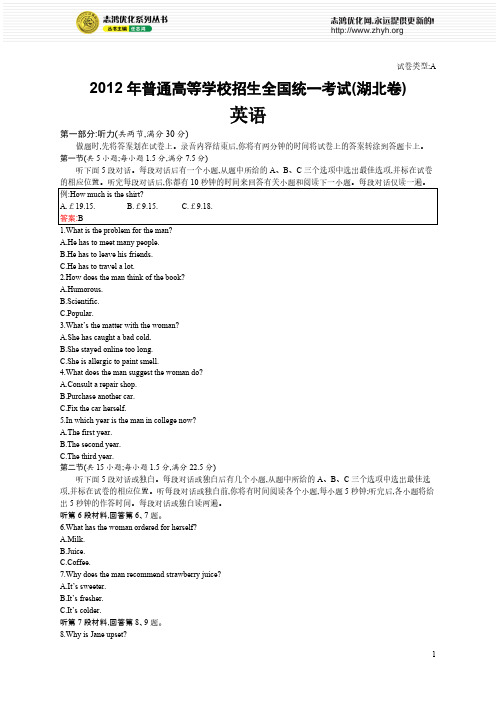
试卷类型:A 2012年普通高等学校招生全国统一考试(湖北卷)英语第一部分:听力(共两节,满分30分)做题时,先将答案划在试卷上。
录音内容结束后,你将有两分钟的时间将试卷上的答案转涂到答题卡上。
第一节(共5小题;每小题1.5分,满分7.5分)听下面5段对话。
每段对话后有一个小题,从题中所给的A、B、C三个选项中选出最佳选项,并标在试卷的相应位置。
听完每段对话后,你都有10秒钟的时间来回答有关小题和阅读下一小题。
每段对话仅读一遍。
例:How much is the shirt?A.£19.15.B.£9.15.C.£9.18.答案:B1.What is the problem for the man?A.He has to meet many people.B.He has to leave his friends.C.He has to travel a lot.2.How does the man think of the book?A.Humorous.B.Scientific.C.Popular.3.What’s the matter with the woman?A.She has caught a bad cold.B.She stayed online too long.C.She is allergic to paint smell.4.What does the man suggest the woman do?A.Consult a repair shop.B.Purchase another car.C.Fix the car herself.5.In which year is the man in college now?A.The first year.B.The second year.C.The third year.第二节(共15小题;每小题1.5分,满分22.5分)听下面5段对话或独白。
2012年普通高等学校招生全国统一考试(湖北卷)

2012年普通高等学校招生全国统一考试(湖北卷)本试题卷共16页,81题。
全卷满分150分。
考试用时120分钟。
(听力部分略)第二部分:选择题(共两节,满分30分)第一节:单项选择(每小题1分,满分10分)21. Two lawyers have donated $50,000 to our school’s campaign “Help the Needy”, which was started by our former headmaster three years ago.A. sponsorB. launchC. organizeD. plan22. Finally, my thanks go to my tutor, who has offered a lot of suggestions and comments on my paper and every page of my draft.A. approvedB. quotedC. polishedD. folded23. Walking alone in the dark, the boy whistled to his courage.A. hold upB. keep upC. set upD. take up24. I’m so glad you’ve come here to this matter in person.A. lead toB. see toC. turn toD. refer to25. The furniture, with its modern style and bright colors, suits modern houses and their gardens, butlooks in the garden of a traditional home.A. out of questionB. out of orderC. out of sightD. out of place26. “Perhaps we need to send for Dr. Smith to see what we can do about it,” Father suggested to his neighbor who had come to discuss the problem.A. tentativelyB. thoughtlesslyC. definitelyD. rudely27. Could you tell the difference between “require” and “request”? I sometimes get puzzled by their meanings.A. dramaticB. regionalC. apparentD. subtle28. Whether building in this area should be pull down has remained ; people are still looking for other possible solutions.contradictoryA. unchallengedB. relevantC. controversialD.29. It is important to have your eyes examined regularly to check for any sign of eye disease that may not have any .A. symptomB. similaritiesC. sampleD. shadow30. The officer insisted that Michael did not follow the correct in applying for a visa.A. patternB. procedureC. programD. perspective第二节:完形填空(每小题1分,满分20分)I tend to accept any idea put forward by experts on TV. One day, a sociologist proposed that the 31 society has been consuming modern humans little by little. For fear that I would become a victim of the consumer society, I 32 hurried to a bicycle shop in my neighborhood. 33 the shopkeeper Mr. Johnson was selling me the bicycle, he said, “This is the best thing you 34 have done. Life has become hopelessly 35 . A bicycle is simple, and it brings to you 36 things: fresh air, sunshine and exercise.” I agreed. Happy as a child, I got on the bicycle and headed out onto the streets. After some time, I 37 at the other end of the town. I was 38 that this simple vehicle could let me 39 long distances in a fairly short time. But how 40 did I really go?Since I hated to be 41 , I went back to Mr. Johnson and ask him to 42 an odometer(里程表) on my bicycle. He agreed, but 43 , “An odometer without a speedometer(速度计)is like a 44 without aknife.” I admitted he was right and in a few minutes, the two devices (装置)were 45 to the handlebars of my bicycle. “ What about a horn?” he then asked. “Look, this horn is no larger than a matchbox and has many 46 .” Attracted by these functions, I bought the horn.“You can’t leave the back part 47 ,” noted Mr. Johnson. He fixed a metal box with buttons 48 the seat, and said, “Is there anything better than this oven when you feel 49 on your way? I can give you special discount.” I was not strong enough to 50 the offer.“I congratulate you once more; this is the best thing you could have done,” said Mr. Johnson in the end.bachelor31. A. adult B. human C. consumer D.32. A. eventually B. immediately C. reluctantly D. gratefully33. A. Although B. Because C. As D. Unless34. A. would B. should C. must D. could35. A. boring B. complicated C. stressful D. tough36. A. natural B. mysterious C. complex D. unique37. A. gave up B. broke down C. calmed down D. ended up38. A. amazed B. amused C. confused D. concerned39. A. march B. drive C. cover D. measure40. A. far B. long C. fast D. deep41. A. unreliable B. impractical C. unprepared D. inaccuraterepair D.lay42. A. fix B. check C.43. A. swore B. added C. replied D. concluded44. A. pencil B. fork C. box D. cake45. A. distributed B. converted C. applied D. attached46. A. shapes B. sizes C. functions D. models47. A. loose B. blank C. bare D. incomplete48. A. beside B. before C. below D. behind49. A. sick B. hungry C. hot D. thirsty50. A. consider B. withdraw C. make D. resist第三部分:阅读理解(每小题2分,满分40)AYou’ve just come home, after living abroad for a few years. Since you’ve been away, has this country changed for the better—or for the worse?If you’ve just arrived back in the UK after a fortnight’s holiday, small changes have probably surprised you—anything from a local greengrocer suddenly being replaced by a mobile-phone shop to someone in your street moving house.So how have things changed to people coming back to Britain after seven, ten or even 15 years living abroad? What changes in society can they see that the rest of us have hardly noticed—or now take for granted? To find out, we asked some people who recently returned.Debi: When we left, Cheltenham, my home town, was a town of white, middle-class families—all very conservative. The town is now home to many eastern Europeans and lots of Australia, who come here mainly to work in hotels and tourism. There are even several shops only for foreigners.Having been an immigrant myself, I admire people who go overseas to find a job. Maybe if I lived in aninner city where unemployment was high, I’d think differently, but I believe foreign settlers have improved this country because they’re more open-minded and often work harder than the natives.Christine: As we flew home over Britain, both of us remarked how green everything looked. But the differences between the place we’d left behind and the one we returned to were brought sharply into focus as soon as we landed.To see policemen with guns in the airport for the first time was frightening—in Cyprus, they’re very relaxed—and I got pulled over by customs officers just for taking a woolen sweater with some metal-made buttons out of my case in the arrivals hall. Everyone seemed to be on guard. Even the airport car-hire firm wanted a credit card rather than cash because they said their vehicles had been used by bank robbers.But anyway, this is still a green, beautiful country. I just wish more people would appreciate what they’ve got.51. After a short overseas holiday, people tend to .A. notice small changesB. expect small changesC. welcome small changesD. exaggerate small changes52. How does Debi look at the foreign settlers?A. Cautiously.B. Positively.C. Skeptically.D. Critically.53. When arriving at the airport in Britain, Christine was shocked by .A. the relaxed policemenB. the messy arrivals hallC. the tight securityD. the bank robbers54. Which might be the best title for the passage?A. Life in Britain.B. Back in Britain.C. Britain in Future.D. Britain in Memory.BWhen my brother and I were young, my mom would take us on Transportation Days.It goes like this: You can’t take any means of transportation more than once. We would start from home, walking two blocks to the rail station. We’d take the train into the city center, then a bus, switching to the tram, then maybe a taxi. We always considered taking a horse carriage in the historic district, but we didn’t like the way the horses were treated, so we never did. At the end of the day, we took the subway to our closest station, where Mom’s friend was waiting to give us a ride home—our first car ride of the day.The good thing about Transportation Days is not only that Mom taught us how to get around. She was born to be multimodal. She understood that depending on cars only was a failure of imagination and, above all, a failure of confidence—the product of a childhood not spent exploring subway tunnels.Once you learn the route map and step with certainly over the gap between the train and the platform, nothing is frightening anymore. New cities are just light-rail lines to be explored. And your personal car, ifyou have one, becomes just one more tool in the toolbox—and often an inadequate one, limiting both your mobility and your wallet.On Transportation Days, we might stop for lunch on Chestnut Street or buy a new book or toy, but the transportation was the point. First, it was exciting enough to watch the world speed by from the train window. As I got older, my mom helped me unlock the mysteries that would otherwise have paralyzed my first attempts to do it myself: How do I know where to get off? How do I know how much it costs? How do I now when I need tickets, and where to get them? What track, what line, which direction, where’s the stop, and will I get when we go under the river?I’m writing this right now on an airplane, a means we didn’t try on our Transportation Days and, we now know, the dirtiest and most polluting of them all. My flight routed me through Philadelphia. My multimodal mom met me for dinner in the airport. She took a train to meet me.55. Which was forbidden by Mom on Transportation Days?A. Having a car ride.B. Taking the train twice.C. Buying more than one toy.D. Touring the historic district.56. According to the writer, what was the greateds benefit of her TransportationDays?A. Building confidence in herself.B. Reducing her use of private cars.C. Developing her senses of direction.D Giving her knowledge about vehicles.57. The underlined word "paralyzed" (in Para.5) is closest in meaning to " ".A. displayedB. justifiedC. ignoredD. ruined58. Which means of transportation does the writer probably disapprove of?A. Airplane.B. Subway.C. Train.D. Car.CIt was a simple letter asking for a place to study at Scotland’s oldest university which helped start a revolution in higher education. A 140-year-old letter written by a lady calling for her to be allowed to study medicine at St Andrews University has been discovered by researchers. Written by Sophia Jex-Blake in 1873, the seven-page document, which urged the university to allow women to study medicine at the institution, was released yesterday on International Women’s Day.The document was discovered buried in the university archives(档案)by part-time history student Lis Smith, who is completing her PhD at St Andrews Institute of Scottish Historical Research. She said:”We knew that Sophia Jex-Blake and her supporters in their effort to open up university medical education for women, had written to the Senatus Academicus(校评议委员会)at St Andrews in an attempt to gain permission to attend classes there, but we didn’t now documentary evidence existed. While searching thearchives for information about the university’s higher certificate for women, I was astonished to come across what must be the very letter Jex-Blake wrote.”In the letter, Sophia and her supporters offered to hire teachears or build suitable buildings for medical school and to arrange for lectures to be delivered in the subjects not already covered at St Andrews. Although her letter was not successful, it eventually led to the establishment of the Ladies Literate in Arts at St Andrews, a distance-learning degree for women. The qualification, which ran from 1877 until the 1930s, gave women access ot university education in the days before they were admitted as students. It was so popular that it survived long after women were admitted as full students to St Andrews in 1892.Ms Jex-Blake went on to help establish the London School of Medicines for Women in 1874. She was accepted by the University of Berne, where she was awarded a medical degree in January 1877. Eventually, she moved back to Edingburgh and opened her own pracitce.59. Sophia wrote a letter to St Andrews University because she wanted .A. to carry out a research project thereB. to set up a medical institute thereC. to study medicine thereD. to deliver lectures there60. Lis Smith found Sophia's letter to St Andrews University .A. by the pure chanceB. in the school officeC. with her supporters' helpD. while reading history books61. Sophia's letter resulted in the establishment of .A. the London School of Medicine for WomenB. a degree programme for womenC. a system of medical educationD. the University of Berne62. When did St Andrews University begin to take full-time women students?A. In 1873.B. In 1874.C. In 1877.D. In 1892.DHow is it that siblings(兄弟姐妹)can turn out so differently? One answer is that in fact each sibling grows up in a different family. The firstborn is, for a while, an only child, and therefore has a completely different experience of the parents than those born later. The next child is, for a while, the youngest, until the situation is changed by a new arrival. The mother and father themselves are changing and growing up too. One sibling might live in a stable and close family in the first few years; another might be raised in a family crisis, with a disappointed mother or an angry father.Sibling competition was identified as an important shaping force as early as in 1918. But more recently, researchers have found many ways in which brother and sisters are a lasting force in each others’ lives. Dr. Annette Henderson says firstborn children pick up vocabulary more quickly than their siblings. The reason for this might be that the later children aren’t getting the same one-on-one time with parents. But that doesn’t mean that the younger children have problems with language development. Later-borns don’tenjoy that much talking time with parents, but instead they harvest lessons from bigger brother and sisters, learning entire phrases and getting an understanding of social concepts such as the difference between “I “ and “me”.A Cambridge University study of 140 children found that sibling created a rich world of play that helped them grow socially. Love-hate relationships were common among the children. Even those siblings who fought the most had just as much positive communication as the other sibling pairs.One way children seek more attention from parents is by making themselves different from their siblings, particularly if they are close in age. Researchers have found that the first two children in a family are typically more different from each other than the second and third. Girls with brothers show their differences to a maximum degree by being more feminine than girls with sisters. A 2003 research paper studied adolescents from 185 families over two years, finding that those who changed to make themselves different from their sibling were successful in increasing the amount of warmth they gained from their parents.63. The underlined part "in a different family" (in Para.1) means " ".A. in a different family environmentB. in different family traditionC. in a different family crisesD. in different families64. In terms of language development, later-borns .A. get their parents' individual guidanceB. learn a lot from their elder siblingsC. experience a lot of difficultiesD. pick up words more quickly65. What was found about fights among siblings?A. Siblings hated fighting and loved playing.B. Siblings in some families fought frequently.C. Siblings fights led to bad sibling relationships.D. Siblings learned to get on together from fights.66. The word "feminine" (in Para.4) means " ".A. having qualities of parentsB. having qualities of womenC. having defensive qualitiesD. having extraordinary qualitiesEBrrriiinnng. The alarm clock announces the start of another busy weekday in the morning. You jump out of bed, rush into the shower, into your clothes and out the door with hardly a moment to think. A stressful journey to work gets your blood pressure climbing. Once at the office, you glance through the newspaper with depressing stories or reports of disasters. In that sort of mood, who can get down to work, particularly some creative, original problem-solving work?The way most of us spend our mornings is exactly opposite to the conditions that promote flexible,open-minded thinking. Imaginative ideas are most likely to come to us when we’re unfocused. If you are one of those energetic morning people, your most inventive time come in the early evening when you are relaxed. Sleepy people’s lack of focus leads to an increase in creative problem solving. By not givingyourself time to tune into your wandering mind, you’re missing out on the surprising solutions it may offer. The trip you take to work doesn’t help, either. The stress slows down the speed with which signals travel between neurons(神经细胞), making inspiratins less likely to occur. And while we all should read a lot about what’s going on in the world, it would not make you feel good for sure, so put that news website or newpaper aside until after the day’s work is done.So what would our mornings look like if we wanted to start them with a full capacity for creative problem solving? We’d set the alarm a few minutes early and lie awake in bed, following our thoughts where they lead. We’d stand a little longer under the warm water of the shower, stopping thingking about tasks in favor of a few more minutes of relaxation. We’d take some deep breaths on our way to work, instead of complaining about heavy traffic. And once in the office—after we get a cup of coffee—we ‘d click on links not to the news of the day but to the funniest videos the web has to offer.67. According to the author, we are more creative when we are .A. focusedB. relaxedC. awakeD. busy68. What does the author imply about newspapers?A. They are solution providers.B. They are a source of inspiration.C. They are normally full of bad news.D. They are more educational than websites.69. By "tune into your wandering mind" (in Para.2), the author means " ".A. wander into the wildB. listen to a beautiful tuneC. switch to the traffic channelD. stop concentrating on anything70. The author writes the last paragraph in order to .A. offer practical suggestionsB. summarize past experiencesC. advocate diverse ways of lifeD. establish a routine for the future第四部分:书面表达(共两节,满分50分)第一节:完成句子(共10小题:每小题2分,满分20分)71. With , some animals are facing the danger of dying out. (cut)由于越来越多的森林被砍伐,一些动物正面临着灭绝的危险。
2012年全国高考英语试题及答案-全国卷(word版)
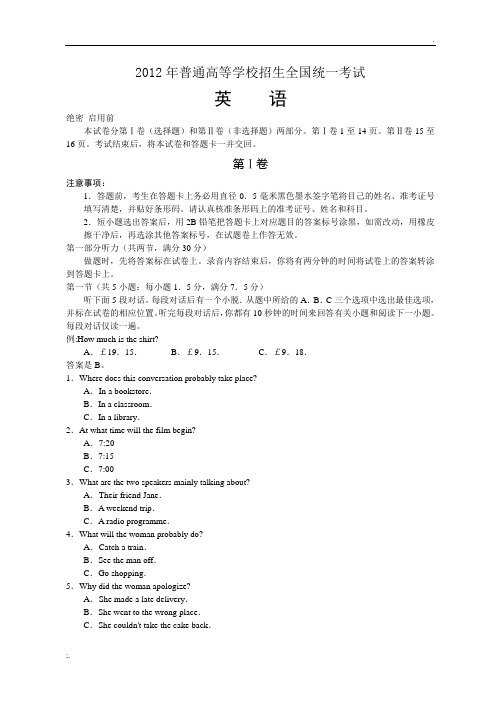
2012年普通高等学校招生全国统一考试英语绝密启用前本试卷分第Ⅰ卷(选择题)和第Ⅱ卷(非选择题)两部分。
第Ⅰ卷1至14页。
第Ⅱ卷15至16页。
考试结束后,将本试卷和答题卡一并交回。
第Ⅰ卷注意事项:1.答题前,考生在答题卡上务必用直径0.5毫米黑色墨水签字笔将目己的姓名、准考证号填写清楚,并贴好条形码。
请认真核准条形码上的准考证号、姓名和科目。
2.短小题选出答案后,用2B铅笔把答题卡上对应题目的答案标号涂黑,如需改动,用橡皮擦干净后,再选涂其他答案标号,在试题卷上作答无效。
第一部分听力(共两节,满分30分)做题时,先将答案标在试卷上。
录音内容结束后,你将有两分钟的时间将试卷上的答案转涂到答题卡上。
第一节(共5小题:每小题1.5分,满分7.5分)听下面5段对话。
每段对话后有一个小脱.从题中所给的A.B.C三个选项中选出最佳选项,并标在试卷的相应位置。
听完每段对话后,你都有10秒钟的时间来回答有关小题和阅读下一小题。
每段对话仅读一遍。
例:How much is the shirt?A.£19.15.B.£9.15.C.£9.18.答案是B。
1.Where does this conversation probably take place?A.In a bookstore.B.In a classroom.C.In a library.2.At what time will the film begin?A.7:20B.7:15C.7:003.What are the two speakers mainly talking about?A.Their friend Jane.B.A weekend trip.C.A radio programme.4.What will the woman probably do?A.Catch a train.B.See the man off.C.Go shopping.5.Why did the woman apologize?A.She made a late delivery.B.She went to the wrong place.C.She couldn't take the cake back.第二节(共15小题;每小题1.5分,满分22.5分)听下面5段对话。
2012年湖北省高考英语真题(含答案)
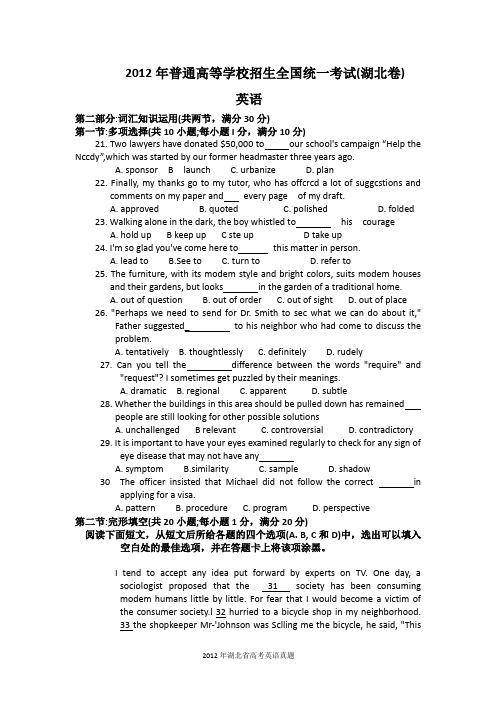
2012年普通高等学校招生全国统一考试(湖北卷)英语第二部分:词汇知识运用(共两节,满分30分)第一节:多项选择(共10小题;每小题I分,满分10分)21. Two lawyers have donated $50,000 to our school's campaign “Help the Nccdy”,which was started by our former headmaster three years ago.A. sponsor B launch C. urbanize D. plan22. Finally, my thanks go to my tutor, who has offcrcd a lot of suggcstions andcomments on my paper and every page of my draft.A. approvedB. quotedC. polishedD. folded23. Walking alone in the dark, the boy whistled to his courageA. hold up B keep up C ste up D take up24. I'm so glad you've come here to this matter in person.A. lead toB.See toC. turn toD. refer to25. The furniture, with its modem style and bright colors, suits modem housesand their gardens, but looks in the garden of a traditional home.A. out of questionB. out of orderC. out of sightD. out of place26. "Perhaps we need to send for Dr. Smith to sec what we can do about it,"Father suggested_ to his neighbor who had come to discuss theproblem.A. tentativelyB. thoughtlesslyC. definitelyD. rudely27. Can you tell the difference between the words "require" and"request"? I sometimes get puzzled by their meanings.A. dramaticB. regionalC. apparentD. subtle28. Whether the buildings in this area should be pulled down has remainedpeople are still looking for other possible solutionsA. unchallenged B relevant C. controversial D. contradictory29. It is important to have your eyes examined regularly to check for any sign ofeye disease that may not have anyA. symptomB.similarityC. sampleD. shadow30 The officer insisted that Michael did not follow the correct inapplying for a visa.A. patternB. procedureC. programD. perspective第二节:完形填空(共20小题;每小题1分,满分20分)阅读下面短文,从短文后所给各题的四个选项(A. B, C和D)中,选出可以填入空白处的最佳选项,并在答题卡上将该项涂黑。
2012年全国统一高考英语试卷(湖北卷)
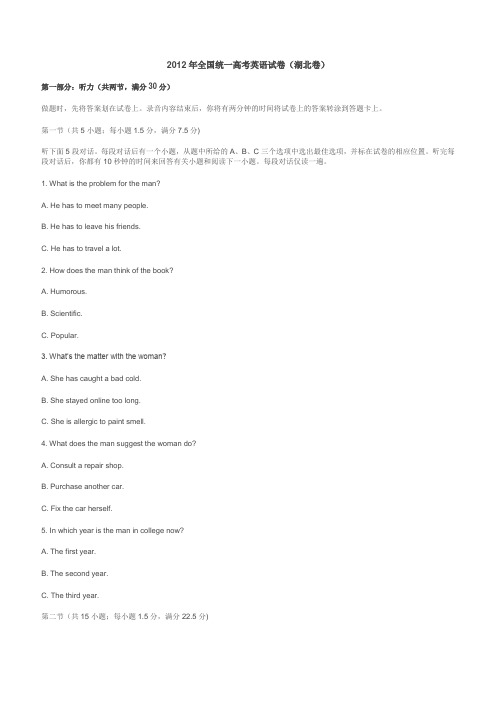
2012年全国统一高考英语试卷(湖北卷)第一部分:听力(共两节,满分30分)做题时,先将答案划在试卷上。
录音内容结束后,你将有两分钟的时间将试卷上的答案转涂到答题卡上。
第一节(共5小题;每小题1.5分,满分7.5分)听下面5段对话。
每段对话后有一个小题,从题中所给的A、B、C三个选项中选出最佳选项,并标在试卷的相应位置。
听完每段对话后,你都有10秒钟的时间来回答有关小题和阅读下一小题。
每段对话仅读一遍。
1. What is the problem for the man?A. He has to meet many people.B. He has to leave his friends.C. He has to travel a lot.2. How does the man think of the book?A. Humorous.B. Scientific.C. Popular.3. What’s the matter with the woman?A. She has caught a bad cold.B. She stayed online too long.C. She is allergic to paint smell.4. What does the man suggest the woman do?A. Consult a repair shop.B. Purchase another car.C. Fix the car herself.5. In which year is the man in college now?A. The first year.B. The second year.C. The third year.第二节(共15小题;每小题1.5分,满分22.5分)听下面5段对话或独白。
每段对话或独白后有几个小题,从题中所给的A、B、C三个选项中选出最佳选项,并标在试卷的相应位置。
ok!2012年高考真题——英语(全国卷)word版及答案

2012年普通高等学校招生全国统一考试英语本试卷分第Ⅰ卷(选择题)和第Ⅱ卷(非选择题)两部分。
第Ⅰ卷1至14页。
第Ⅱ卷15至16页。
考试结束后,将本试卷和答题卡一并交回。
第Ⅰ卷注意事项:1.答题前,考生在答题卡上务必用直径0.5毫米黑色墨水签字笔将目己的姓名、准考证号填写清楚,并贴好条形码。
请认真核准条形码上的准考证号、姓名和科目。
2.短小题选出答案后,用2B铅笔把答题卡上对应题目的答案标号涂黑,如需改动,用橡皮擦干净后,再选涂其他答案标号,在试题卷上作答无效。
第一部分听力(共两节,满分30分)做题时,先将答案标在试卷上。
录音内容结束后,你将有两分钟的时间将试卷上的答案转涂到答题卡上。
第一节(共5小题:每小题1.5分,满分7.5分)听下面5段对话。
每段对话后有一个小脱.从题中所给的A. B.C三个选项中选出最佳选项,并标在试卷的相应位置。
听完每段对话后,你都有10秒钟的时间来回答有关小题和阅读下一小题。
每段对话仅读一遍。
例:How much is the shirt?A.£19.15.B.£9.15.C. £9.18. 答案是B。
1. Where does this conversation probably take place?A.In a bookstore. B. In a classroom. C. In a library.2. At what time will the film begin?A.7:20B.7:15C.7:003. What are the two speakers mainly talking about?A. Their friend Jane.B. A weekend trip.C. A radio programme.4. What will the woman probably do?A. Catch a train.B. See the man off.C. Go shopping.5. Why did the woman apologize?A. She made a late delivery.B. She went to the wrong place.C. She couldn't take the cake back.第二节(共15小题;每小题1.5分,满分22.5分)听下面5段对话。
年高考英语考试试卷及答案(湖北卷).doc
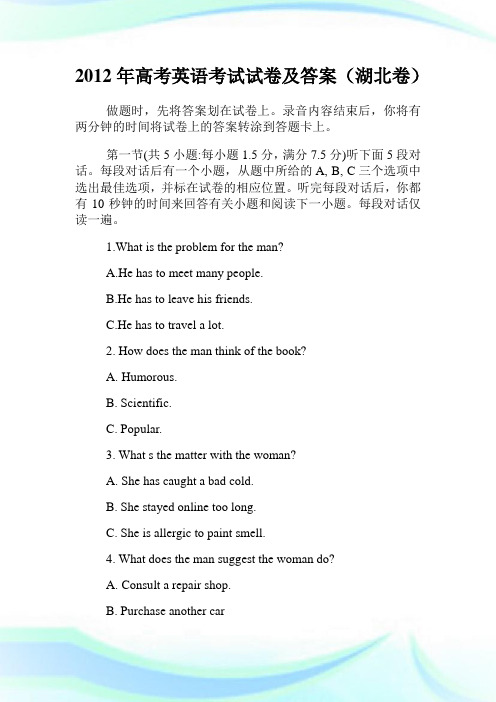
2012年高考英语考试试卷及答案(湖北卷)做题时,先将答案划在试卷上。
录音内容结束后,你将有两分钟的时间将试卷上的答案转涂到答题卡上。
第一节(共5小题:每小题1.5分,满分7.5分)听下面5段对话。
每段对话后有一个小题,从题中所给的A, B, C三个选项中选出最佳选项,并标在试卷的相应位置。
听完每段对话后,你都有10秒钟的时间来回答有关小题和阅读下一小题。
每段对话仅读一遍。
1.What is the problem for the man?A.He has to meet many people.B.He has to leave his friends.C.He has to travel a lot.2. How does the man think of the book?A. Humorous.B. Scientific.C. Popular.3. What s the matter with the woman?A. She has caught a bad cold.B. She stayed online too long.C. She is allergic to paint smell.4. What does the man suggest the woman do?A. Consult a repair shop.B. Purchase another carC. Fix the car herself.5. In which year is the man in college now?A. The first year.B. The second year.C. The third year.第二节(共15小短:每小题1.5分,满分22.5分)听下面5段对话或独白。
每段对话或独白后有几个小题,从题中所给的A、B、C三个选项中选出最佳选项,并标在试卷的相应位置。
听每段对话或独白前,你将有时间阅读各个小题,每小题5秒钟:听完后,各小题将给出5秒钟的作答时间。
2012年湖北英语高考试题及答案
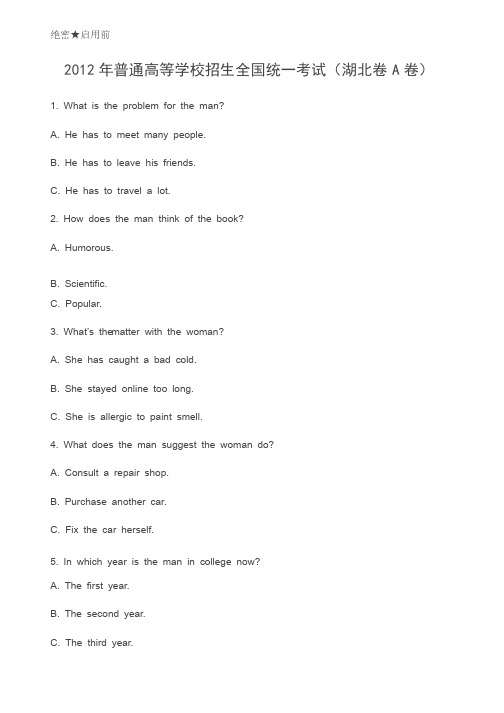
绝密★启用前2012年普通高等学校招生全国统一考试(湖北卷A卷)1. What is the problem for the man? A. He has to meet many people. B. He has to leave his friends. C. He has to travel a lot. 2. How does the man think of the book? A. Humorous. B. Scientific. C. Popular. 3. What’s the matter with the woman? A. She has caught a bad cold. B. She stayed online too long. C. She is allergic to paint smell. 4. What does the man suggest the woman do? A. Consult a repair shop. B. Purchase another car. C. Fix the car herself. 5. In which year is the man in college now? A. The first year. B. The second year. C. The third year. 第二节(共15小题;每小题1.5分,满分22.5分) 听下面5段对话或独白。
每段对话或独白后有几个小题,从题中所给的A、B、C三个选项中选出最佳选项,并标在试卷的相应位置。
听每段对话或独白前,你将有时间阅读各个小题,每小题5秒钟;听完后,各小题将给出5秒钟的作答时间。
每段对话或独白读两遍。
听第6段材料,回答第6、7题。
6. What has the woman ordered for herself? A. Milk. B. Juice. C. Coffee. 7. Why does the man recommend strawberry juice? A. It’s sweeter.B. It’s fresher.C. It’s colder.听第7段材料,回答第8、9题。
2012年普通高考(湖北卷)英语附答案word版
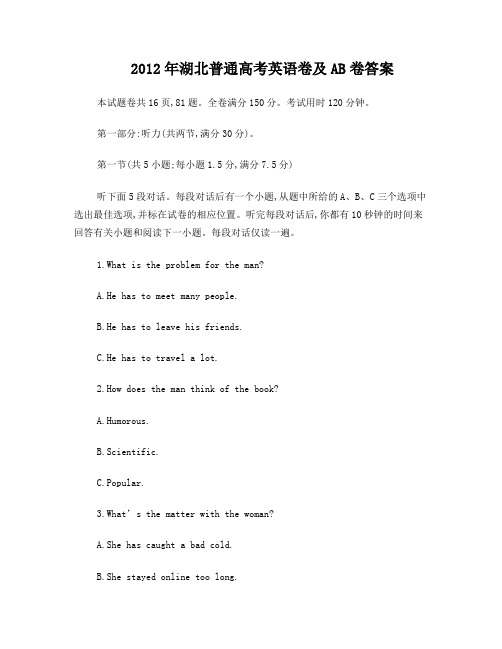
2012年湖北普通高考英语卷及AB卷答案本试题卷共16页,81题。
全卷满分150分。
考试用时120分钟。
第一部分:听力(共两节,满分30分)。
第一节(共5小题;每小题1.5分,满分7.5分)听下面5段对话。
每段对话后有一个小题,从题中所给的A、B、C三个选项中选出最佳选项,并标在试卷的相应位置。
听完每段对话后,你都有10秒钟的时间来回答有关小题和阅读下一小题。
每段对话仅读一遍。
1.What is the problem for the man?A.He has to meet many people.B.He has to leave his friends.C.He has to travel a lot.2.How does the man think of the book?A.Humorous.B.Scientific.C.Popular.3.What’s the matter with the woman?A.She has caught a bad cold.B.She stayed online too long.C.She is allergic to paint smell.4.What does the man suggest the woman do?A.Consult a repair shop.B.Purchase another car.C.Fix the car herself.5.In which year is the man in college now?A.The first year.B.The second year.C.The third year.第二节(共15小题;每小题1.5分,满分22.5分)听下面5段对话或独白。
每段对话或独白后有几个小题,从题中所给的A、B、C三个选项中选出最佳选项,并标在试卷的相应位置。
听每段对话或独白前,你将有时间阅读各个小题,每小题5秒钟;听完后,各小题将给出5秒钟的作答时间。
◆2012年全国高考英语试题及答案-湖北卷
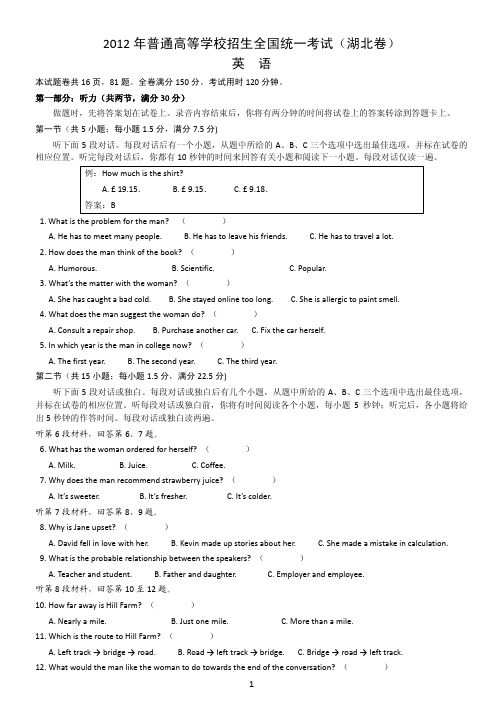
2012年普通高等学校招生全国统一考试(湖北卷)英 语本试题卷共16页,81题。
全卷满分150分。
考试用时120分钟。
第一部分:听力(共两节,满分30分)做题时,先将答案划在试卷上。
录音内容结束后,你将有两分钟的时间将试卷上的答案转涂到答题卡上。
第一节(共5小题;每小题1.5分,满分7.5分)听下面5段对话。
每段对话后有一个小题,从题中所给的A、B、C三个选项中选出最佳选项,并标在试卷的相应位置。
听完每段对话后,你都有10秒钟的时间来回答有关小题和阅读下一小题。
每段对话仅读一遍。
例:How much is the shirt?A. £ 19.15.B. £ 9.15.C. £ 9.18.答案:B1. What is the problem for the man? ( )A. He has to meet many people.B. He has to leave his friends.C. He has to travel a lot.2. How does the man think of the book? ( )A. Humorous.B. Scientific.C. Popular.3. What’s the matter with the woman? ( )A. She has caught a bad cold.B. She stayed online too long.C. She is allergic to paint smell.4. What does the man suggest the woman do? ( )A. Consult a repair shop.B. Purchase another car.C. Fix the car herself.5. In which year is the man in college now? ( )A. The first year.B. The second year.C. The third year.第二节(共15小题;每小题1.5分,满分22.5分)听下面5段对话或独白。
2012高考英语湖北卷 打印2012高考英语湖北卷 打印
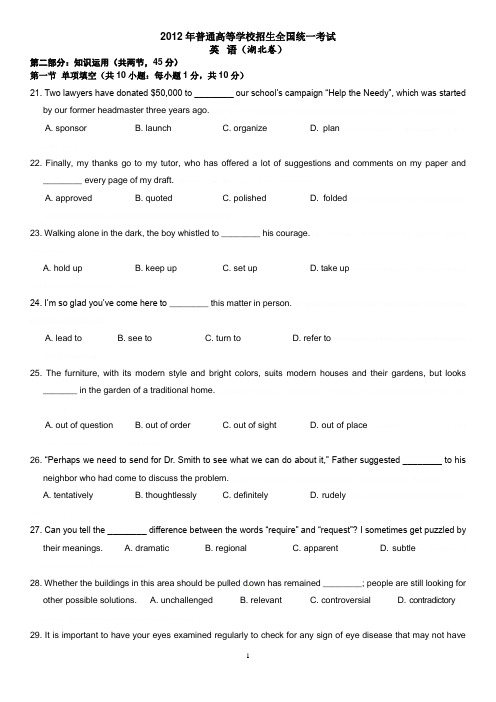
2012年普通高等学校招生全国统一考试英语(湖北卷)第二部分:知识运用(共两节,45分)第一节单项填空(共10小题:每小题1分,共10分)21. Two lawyers have donated $50,000 to ________ our school’s campaign “Help the Needy”, which was startedby our former headmaster three years ago.A. sponsorB. launchC. organizeD. planc(H+)D22. Finally, my thanks go to my tutor, who has offered a lot of suggestions and comments on my paper and________ every page of my draft.=A. approvedB. quotedC. polishedD. folded D.23. Walking alone in the dark, the boy whistled to ________ his courage.A. hold upB. keep upC. set upD. take up卷试题E试卷试题中间四句化学教案均用“对面落笔”的24. I’m so glad you’ve come here to ________ this matter in person.人数大幅增长化学教案并点出了游学的热门目的地化学教案材料二以天津为例化学教案指出家长们的选择还是很理的试卷试题A. lead toB. see toC. turn toD. refer to然而化学教案问题在于化学教案是否可以由此把伯林看成纯粹的狐狸呢?也不尽然试卷试题刺25. The furniture, with its modern style and bright colors, suits modern houses and their gardens, but looks_______ in the garden of a traditional home.A. out of questionB. out of orderC. out of sightD. out of place26. “Perhaps we need to send for Dr. Smith to see what we can do about it,” Father suggested ________ to hisneighbor who had come to discuss the problem.A. tentativelyB. thoughtlesslyC. definitelyD. rudely27. Can you tell the ________ difference between the words “require” and “request”? I sometimes get puzzled bytheir meanings. A. dramatic B. regional C. apparent D. subtle28. Whether the buildings in this area should be pulled d own has remained ________; people are still looking forother possible solutions. A. unchallenged B. relevant C. controversial D. contradictory 29. It is important to have your eyes examined regularly to check for any sign of eye disease that may not haveany ________. A. symptom B. similarity C. sample D. shadow前言往行/玄每与之言/不倦也/玄出行/殷仲文卞范之之徒/皆骑马散从/而使景仁陪辇30. The officer insisted that Michael did not follow the correct ________ in applying for a visa. 教案旁观者实在不必对那些追求编制、希求稳定工作的年轻人痛心疾首试卷试题A. patternB. procedureC. programD. perspective”潮菜的很多菜品及调料化学教案是与闽南菜共有或者大第二节:完形填空(共20小题;每小题1分,满分20分)I tend to accept any idea put forward rd by experts on TV. One day, a sociologist proposed that the 31 society has been consuming modern humans little by little. For fear that I would become a victim of the consumer society, I 32 hurried to a bicycle shop in my neighborhood. 33 the shopkeeper Mr. Johnson was selling me the bicycle, he said, “This is the best thing you 34 have done. Life has become hopelessly 35 . A bicycle is simple, and it brings to you 36 things: fresh air, sunshine and exercise.” I agreed. Happy as a child,I got on the bicycle and headed out onto the streets. After some time, I 37 at the other end of the town. I was38 that this simple vehicle could let me 39 long distances in a fairly short time. But how 40 did I really go?甲说:“生物工程类专业将来可能难就业化学教案填报需谨慎试卷试题”Since I hated to be 41 , I went back to Mr. Johnson and asked him to 42 an odometer (里程表) on my bicycle. He agreed, but 43 , “An odometer without a speedometer (速度计) is like a 44 without a knife.” I admitted he was right and in a few minutes, the two devices (装置) were 45 to the handlebars of my bicycle. “What about a horn?” he then asked. “Look, this horn is no larger than a matchbox and has many 46 .” Attract ed by these functions, I bought the horn.(8)元嘉草草化学教案封狼居胥化学教案试卷试题(辛弃疾《永遇乐·京口“You can’t leave the back part 47 ,” noted Mr. Johnson. He fixed a metal box with buttons 48 the seat, and said, “Is there anything better than this oven when you feel 49 on your way? I can give you a special discount.” I was not strong enough to 50 the offer.选项命制都是明显的不会引起争议的错误化学教案即所谓的“硬伤”化学教案在答题时注意寻找这些硬伤试卷试题“I congratulate you once more; this is the best thing you could have done,” said Mr. Johnson in the end.③分子中无甲基(6)试以苯酚、氯乙酸钠(ClCH2COONa)、正丁醇为原料(无机试剂31. A. adult B. human C. consumer D. bachelor32. A. eventually B. immediately C. reluctantly D. gratefully33. A. Although B. Because C. As D. Unless34. A. would B. should C. must D. could35. A. boring B. complicated C. stressful D. tough36. A. natural B. mysterious C. complex D. unique37. A. gave up B. broke down C. calmed down D. ended up38. A. amazed B. amused C. confused D. concerned39. A. march B. drive C. cover D. measure40. A. far B. long C. fast D. deep41. A. unreliable B. impractical C. unprepared D. inaccurate42. A. fix B. check C. repair D. lay43. A. swore B. added C. replied D. concluded44. A. pencil B. fork C. box D. cake45. A. distributed B. converted C. applied D. attached46. A. shapes B. sizes C. functions D. models47. A. loose B. blank C. bare D. incomplete48. A. beside B. before C. below D. behind49. A. sick B. hungry C. hot D. thirsty50. A. consider B. withdraw C. make D. resist第三部分:阅读理解(共20小题;每小题2分,满分40分)AYou’ve just come home, after living abroad for a few years. Since you’ve been away, has this country changed for the better—or for the worse?If you’ve just arrived back in the UK after a fortnight’s holiday, small changes have probably surprised you—anything from a local greengrocer suddenly being replaced by a mobile-phone shop to someone in your street moving house.So how have things changed to people coming back to Britain after seven, ten or even 15 years living abroad? What changes in society can they see that the rest of us have hardly noticed—or now take for granted? To find out, we asked some people who recently returned.Debi: When we left, Cheltenham, my home town, was a town of white, middle-class families—all very conservative (保守的). The town is now home to many eastern Europeans and lots of Australians, who come here mainly to work in hotels and tourism. There are even several shops only for foreigners.Having been an immigrant (移民) myself, I admire people who go overseas to find a job. Maybe if I lived in an inner city where unemployment was high, I’d think differently, but I believe foreign settlers have improved this country bec ause they’re more open-minded and often work harder than the natives.Christine: As we flew home over Britain, both of us remarked how green everything looked. But the differences between the place we’d left behind and the one we returned to were brought sharply into focus as soon as we landed.To see policemen with guns in the airport for the first time was frightening—in Cyprus, they’re very relaxed—and I got pulled over by customs officers just for taking a woolen sweater with some metal-made buttons out of my case in the arrivals hall. Everyone seemed to be on guard. Even the airport car-hire firm wanted a credit card rather than cash because they said their vehicles had been used by bank robbers.But anyway, this is still a green, beautiful country. I just wish more people would appreciate what they’ve got.51. After a short overseas holiday, people tend to _______.A. notice small changesB. expect small changesC. welcome small changesD. exaggerate small changes52. How does Debi look at the foreign settlers?A. Cautiously.B. Positively.C. Sceptically.D. Critically.53. When arriving at the airport in Britain, Christine was shocked by _______.A. the relaxed policemenB. the messy arrivals hallC. the tight securityD. the bank robbers54. Which might be the best title for the passage?A. Life in Britain.B. Back in Britain.C. Britain in Future.D. Britain in Memory.20试卷试题①文言文是传统文化的精粹②文言文与白话文有着紧密的联系BWhen my brother and I were young, my mom would take us on Transportation Days. (1)配制(NH4)2Fe(SO4)2·6H2O溶液时化学教案需加入少量稀硫酸化学教案目的是▲It goes like this: You can’t take any means of transportation more than once. We would start from home, walking two blocks to the rail station. We’d take the train into the city center, then a bus, switch ing to the tram, then maybe a taxi. We always considered taking a horse carriage in the historic district, but we didn’t like the way the horses were treated, so we never did. At the end of the day, we took the subway to our closest station, where M om’s f riend was waiting to give us a ride home—our first car ride of the day.到头劳顿不已化学教案低声下气向别人索取衣食化学教案或山行水宿化学教案颠踣流离化学教案、The good thing about Transportation Days is not only that Mom taught us how to get around. She was born to be multimodal (多方式的). She understood that depending on cars only was a failure of imagination and, above all, a failure of confidence—the product of a childhood not spent exploring subway tunnels. ⑤菜系之名化学教案实际是上世纪70年代后才出现的新名词化学教案基本是按照行政区域进、Once you learn the route map and step with certainty over the gap between the train and the platform, nothing is frightening anymore. New cities are just light-rail lines to be explored. And your personal car, if you have one, becomes just one more tool in the toolbox—and often an inadequate one, limiting both your mobility and your wallet.②丁没有被财经专业录取还有其他选择化学教案并非没有前途了试卷试题On Transportation Days, we might stop for lunch on Chestnut Street or buy a new book or toy, but the transportation was the point. First, it was exciting enough to watch the world speed by from the train window. As I got older, my mom helped me unlock the mysteries that would otherwise have paralyzed my first attempts to do it myself: How do I know where to get off? How do I know how much it costs? How do I know when I need tickets, and where to get them? What track, what line, which direction, where’s the stop, and will I get wet when we go under the river?十多年后化学教案老板因为窃取同行公司的商业机密化学教案被对手告上法庭试卷试题律师对老板说化学教案这个案I’m wr iting this right now on an airplane, a means we didn’t try on our Transpor tation Days and, we now know, the dirtiest and most polluting of them all. My flight routed me through Philadelphia. My multimodal mom met me for dinner in the airport. She took a train to meet me. A试卷试题“名讳”是出现在我国古代一种特有的礼仪文化现象试卷试题遇到君主或尊长者时,不能直呼其名,也称作避名讳试卷试题55. Which was forbidden by Mom on Transportation Days?b g KI晶体化学教案再滴入少量2 mol/L的H2SO4溶液化学教案充分反应试卷试题第二步:A. Having a car ride.B. Taking the train twice.C. Buying more than one toy.D. Touring the historic district.②早晨起来化学教案睁开眼睛就感受到裹入柴达木巨大的无边无沿的苍茫与苍凉之中了试卷56. According to the writer, what was the greatest benefit of her Transportation Days?A. Building confidence in herself.B. Reducing her use of private cars.C. Developing her sense of direction.D. Giving her knowledge about vehicles.57. The underlined word “paralyzed” (in Para. 5) is closest in meaning to “_______”.A. displayedB. justifiedC. ignoredD. ruined58. Which means of transportation does the writer probably disapprove of?A. Airplane.B. Subway.C. Tram.D. Car.风味试卷试题根据语境,侧重于主观体验,故应选“滋味”试卷试题“痛痛快快”,舒畅,尽兴,爽快;“淋、CIt was a simple letter asking for a place to study at Scotland’s oldest university which helped start a revolution in higher education. A 140-year-old letter written by a lady calling for her to be allowed to study medicine at St Andrews University has been discovered by researchers. Written by Sophia Jex-Blake in 1873, the seven-page document, which urged the university to allow women to study medicine at the institution, was released yesterday on International Women’s Day.十多年后化学教案老板因为窃取同行公司的商业机密化学教案被对手告上法庭试卷试题律师对老板说化学教案这个案The document was discovered buried in the university archives (档案) by part-time history student Lis Smith, who is comp leting her PhD at St Andrews Institute of Scottish Historical Research. She said: “We knew that Sophia Jex-Blake and her supporters, in their effort to open up university medical education for women, had written to the Senatus Academicus(校评议委员会) at St Andrews in an attempt to gain permission to attend classes there, but we didn’t know documentary evidence existed. While searching the archives for information about the university’s higher certificate for women, I was astonished to come across what must be t he very letter Jex-Blake wrote.”粉末均匀混合化学教案在800℃.的氩气中烧结6小时化学教案即可制成硅酸亚铁锂试卷试题①合成硅酸In the letter, Sophia and her supporters offered to hire teachers or build suitable buildings for a medical school and to arrange for lectures to be delivered in the subjects not already covered at St Andrews. Although her letter was not successful, it eventually led to the establishment of the Ladies Literate in Arts at St Andrews, a distance-learning degree for women. The qualification, which ran from 1877 until the 1930s, gave women access to university education in the days before they were admitted as students. It was so popular that it survived long after women were admitted as full students to St Andrews in 1892.苞以十月下旬至家化学教案留八日化学教案便饥驱宣、歙间试卷试题入泾河化学教案路见左右高Ms Jex-Blake went on to help establish the London School of Medicine for Women in 1874. She was accepted by the University of Berne, where she was awarded a medical degree in January 1877. Eventually, she moved back to Edinburgh and opened her own practice. 了历史文化的美食试卷试题族群饮食化学教案就是这样一些能够引起文化认同感的食物、59. Sophia wrote a letter to St Andrews University because she wanted _______.C试卷试题潮菜在本土之外出现多流派的现象化学教案在其他菜系中是极其罕见的化学教案这是潮菜在众多菜系中能独领风骚的主要原因试卷试题A. to carry out a research project thereB. to set up a medical institute there调笑令·归雁苏轼归雁化学教案归雁化学教案饮啄江南南岸试卷试题将飞却下盘桓化学教案C. to study medicine thereD. to deliver lectures there教案觉而怛然增离索之恨试卷试题(4分)(2)每念兹事化学教案如沉疴之附其身化学教60. Lis Smith found Sophia’s letter to St Andrews University _______.化学教案单株单个化学教案据地自生试卷试题看不到印象中的森林和草地上那种或互相拥挤互A. by pure chanceB. in the scho ol office⑤菜系之名化学教案实际是上世纪70年代后才出现的新名词化学教案基本是按照行政区域进、C. with her supporters’ helpD. while reading history books13试卷试题下列有关溶液中粒子浓度的关系式中正确的是()A试卷试题c(61. Sophia’s letter resulted in the establishment of _______.A. the London School of Medicine for WomenB. a degree programme for womenC. a system of medical educationD. the University of Berne62. When did St Andrews University begin to take full-time women students?A. In 1873.B. In 1874.C. In 1877.D. In 1892.DHow is it that siblings (兄弟姐妹) can turn out so differently? One answer is that in fact each sibling grows up in a different family. The firstborn is, for a while, an only child, and therefore has a completely different experience of the parents than those born later. The next child is, for a while, the youngest, until the situation is changed by a new arrival. The mother and father themselves are changing and growing up too. One sibling might live in a stable and close family in the first few years; another might be raised in a family crisis, with a disappointed mother or an angry father.Sibling competition was identified as an important shaping force as early as in 1918. But more recently, researchers have found many ways in which brothers and sisters are a lasting force in each others’ lives. Dr. Annette Henderson says firstborn children pick up vocabulary more quickly than their siblings. The reason for this might be that the later children aren’t getting the same one-on-one time with parents. But that doesn’t mean that the younger children have problems with language development. Later-borns don’t enjoy t hat much talking time with parents, but instead they harvest lessons from bigger brothers and sisters, learning entire phrases and getting an understanding of social concepts such as the difference between “I” and “me”.A Cambridge University study of 140 children found that siblings created a rich world of play that helped them grow socially. Love-hate relationships were common among the children. Even those siblings who fought the most had just as much positive communication as the other sibling pairs.One way children seek more attention from parents is by making themselves different from their siblings, particularly if they are close in age. Researchers have found that the first two children in a family are typically more different from each other than the second and third. Girls with brothers show their differences to a maximum degree by being more feminine than girls with sisters. A 2003 research paper studied adolescents from 185 families over two years, finding that those who changed to make themselves different from their siblings were successful in increasing the amount of warmth they gained from their parents.63. The underlined part “in a different family” (in Para. 1) means “_______”.A. in a different family environmentB. in a different family traditionC. in different family crisesD. in different families64. In terms of language development, later-borns ________.A. get their parents’ individual guidanceB. learn a lot from their elder siblingsC. experience a lot of difficultiesD. pick up words more quickly65. What was found about fights among siblings?A. Siblings hated fighting and loved playing.B. Siblings in some families fought frequently.C. Sibling fights led to bad sibling relationships.D. Siblings learned to get on together from fights.66. The word “feminine” (in Para. 4) means “_______”.A. having qualities of parentsB. having qualities of womenC. having defensive qualitiesD. having extraordinary qualitiesEBrrriiinnng. The alarm clock announces the start of another busy weekday in the morning. You jump out of bed, rush into the shower, into your clothes and out the door with hardly a moment to think. A stressful journey to work gets your blood pressure climbing. Once at the office, you glance through the newspaper with depressing stories or reports of disasters. In that sort of mood, who can get down to work, particularly some creative, original problem-solving work?The way most of us spend our mornings is exactly opposite to the conditions that promote flexible, open-minded thinking. Imaginative ideas are most likely to come to us when we’re unfocused. If you are one of those energetic morning people, your most inventive time comes in the early evening when you are relaxed. Sleepy people’s lack of focus leads to an increase in creative problem solving. By not giving yourself time to tune into your wandering mind, you’re missing out on the surprising solutions it may o ffer.教案或山行水宿化学教案颠顿怵迫化学教案或胥易技系束缚于尘事化学教案不能一日宽闲The trip you take to work doesn’t help, either. The stress slows down the speed with which signals travel between neurons (神经细胞), making inspirations less likely to occur. And while we all should read a lot about what’s going on in the world, it would not make you feel good for sure, so put that news website or newspaper aside until after the day’s work is done.So what would our mornings look like if we wanted to start them with a full capacity for creative problem solving? We’d set the alarm a few minutes ea rly and lie awake in bed, following our thoughts where they lead. We’d stand a little longer under the warm water of the shower, stopping thinking about tasks in favor of a few more minutes of relaxation. We’d take some deep breaths on our way to work, instead of complaining about heavy traffic. And once in the office—after we get a cup of coffee—we’d click on links not to the news of the day but to the funniest videos the web has to offer.67. According to the author, we are more creative when we are _______.A. focusedB. relaxedC. awakeD. busy68. What does the author imply about newspapers?A. They are solution providers.B. They are a source of inspiration.C. They are normally full of bad news.D. They are more educational than websites.69. By “tune into your wandering mind” (in Para. 2), the author means “_______”.A. wander into the wildB. listen to a beautiful tuneC. switch to the traffic channelD. stop concentrating on anything70. The author writes the last paragraph in order to _______.A. offer practical suggestionsB. summarize past experiencesC. advocate diverse ways of lifeD. establish a routine for the future第四部分:书面表达(共两节,满分50分)第一节:完成句子(共10小题;每小题2分,满分20分)阅读下列各小题,根据汉语提示,用句末括号内的英语单词完成句子,并将答案写在答题卡上的相应题号后。
20XX普通高等学校全国统一考试_2012年普通高等学校招生全国统一考试(湖北卷)A卷[修改版]
![20XX普通高等学校全国统一考试_2012年普通高等学校招生全国统一考试(湖北卷)A卷[修改版]](https://img.taocdn.com/s3/m/d8e9a4d14b35eefdc9d33329.png)
分析本试卷之命题思路参照了2012年湖北高考英语试卷新模式和《2012年湖北省高考英语考试大纲》和《考试补充说明》,考试内容按照近几年比较稳定的试卷模式进行编排,整套试卷难度控制较为适宜,中档题较多,适合大部分参考学生。
听力平稳,材料真实,音速适当,音质清晰,多项选择题中,大部分试题难易适中,完型填空偏难,阅读理解所选文章难度适中,但学生答题却不够理想,完成句子在前几年的基础上,题型作了轻微调整,不再是只完成空格处的汉语译成英语,而是要依据整个所给汉语句子以及所给的部分英语内容去完成所缺英文内容,同时还增加了分值,即由原来的每小题1.5分增加到现在的每题2分,加大了对考生应试能力的区分度,书面表达也增加了分值,从25分增加到30分。
第二部分依照大纲和湖北省考试说明,全面考查词汇知识。
命题难易适中,常规思路考法,考查了两个动词短语,两个动词、两个名词、两个形容词、一个副词和一个介词短语。
与前几年相比较,增加了一个形容词的考查,减少了一个动词短语的考查。
题干不太长,大部分考生有充足的理由确定正确答案。
分析湖北试卷的完形填空,不难得出它的一般特点:突出语篇、强调应用、注重词语辨析、词组搭配和对考生综合应用基础知识以及各种解题能力的考查。
完成句子总的说来是比较平和,基本按照湖北考纲组织的题目,即:回归语法,注重基础。
今年的完成句子与往年不同的是,往年的完成句子只给出要完成部分的汉语,而今年的完成句子将汉语全部给出,增加了阅读量和完成的难度。
答案第一部分第一节1~5 bacbc第二节6~10 cbbac 11~15 baaca16~20 cbabc第二部分第一节21~25 acbbd 26~30 adcab第二节31~35 cbcdb 36~40 adaca41~45 dabbd 46~50 ccdbd第三部分51~55 abcbb 56~60 adaca61~65 bdabd 66~70 bbcda第四部分第一节71. more and more forests/trees (being) cut down72. regarded as one of the best73. what it was74. does she care (about)75. would not have missed76. hard/much i (had) tried77. will/would be put on78. asking for leave (first)79. different from/than that80. what they appear (to be)第二节one possible version:three years ago i failed an important exam in my life and became a student in an ordinary school. disappointed as i felt at the shabby campus and the poorly equipped classroom, i found the teachers patient and considerate. besides, i enjoyed the friendly atmosphere in class. i decided to make the best of it. i worked hard and got along well with my teachers and classmates. whenever i had difficulties, they were always available. soon, i became one of the top students in my class, which greatly increased my confidence and got me motivated.my experience tells me that it is not what you are given but how you make use of it that determines who you are.解析第二部分第一节21. a。
2012年高考英语考试试卷及答案(湖北卷)
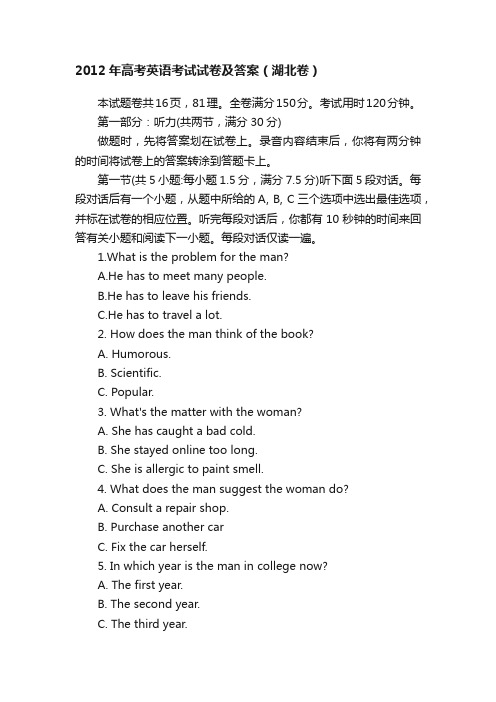
2012年高考英语考试试卷及答案(湖北卷)本试题卷共16页,81理。
全卷满分150分。
考试用时120分钟。
第一部分:听力(共两节,满分30分)做题时,先将答案划在试卷上。
录音内容结束后,你将有两分钟的时间将试卷上的答案转涂到答题卡上。
第一节(共5小题:每小题1.5分,满分7.5分)听下面5段对话。
每段对话后有一个小题,从题中所给的A, B, C三个选项中选出最佳选项,并标在试卷的相应位置。
听完每段对话后,你都有10秒钟的时间来回答有关小题和阅读下一小题。
每段对话仅读一遍。
1.What is the problem for the man?A.He has to meet many people.B.He has to leave his friends.C.He has to travel a lot.2. How does the man think of the book?A. Humorous.B. Scientific.C. Popular.3. What's the matter with the woman?A. She has caught a bad cold.B. She stayed online too long.C. She is allergic to paint smell.4. What does the man suggest the woman do?A. Consult a repair shop.B. Purchase another carC. Fix the car herself.5. In which year is the man in college now?A. The first year.B. The second year.C. The third year.第二节(共15小短:每小题1.5分,满分22.5分)听下面5段对话或独白。
- 1、下载文档前请自行甄别文档内容的完整性,平台不提供额外的编辑、内容补充、找答案等附加服务。
- 2、"仅部分预览"的文档,不可在线预览部分如存在完整性等问题,可反馈申请退款(可完整预览的文档不适用该条件!)。
- 3、如文档侵犯您的权益,请联系客服反馈,我们会尽快为您处理(人工客服工作时间:9:00-18:30)。
2012年普通高等学校招生全国统一考试(湖北卷)英语本试题卷共16页,81理。
全卷满分150分。
考试用时120分钟。
★祝考试顺利★注意事项:1.答卷前,考生务必将白己的姓名、准考证号填写在试题卷和答题卡上.并将准考证号条形码粘贴在答题卡上的指定位置。
用统一提供的2B铅笔将答题卡上试卷类型A后的方框涂黑。
2.选择题的作答:每小题选出答案后,用统一提供的2B铅笔把答题卡上对应题目的答案标号涂黑。
如需改动,用橡皮檫干净后,再选涂其它答案标号。
答在试题卷、草稿纸上无效。
3.完成句子和短文写作班的作答:用统一提供的签字笔将答案直接答在答题卡上对应的答题区域内。
答在试题卷、草稿纸上无效。
4.考生必须保持答改卡的整洁。
考试结束后,请将本试题卷和答题卡一并上交。
第一部分:听力(共两节,满分30分)做题时,先将答案划在试卷上。
录音内容结束后,你将有两分钟的时间将试卷上的答案转涂到答题卡上。
第一节(共5小题:每小题1.5分,满分7.5分)听下面5段对话。
每段对话后有一个小题,从题中所给的A, B, C三个选项中选出最佳选项,并标在试卷的相应位置。
听完每段对话后,你都有10秒钟的时间来回答有关小题和阅读下一小题。
每段对话仅读一遍。
1.What is the problem for the man?A.He has to meet many people.B.He has to leave his friends.C.He has to travel a lot.2. How does the man think of the book?A. Humorous.B. Scientific.C. Popular.3. What's the matter with the woman?A. She has caught a bad cold.B. She stayed online too long.C. She is allergic to paint smell.4. What does the man suggest the woman do?A. Consult a repair shop.B. Purchase another carC. Fix the car herself.5. In which year is the man in college now?A. The first year.B. The second year.C. The third year.第二节(共15小短:每小题1.5分,满分22.5分)听下面5段对话或独白。
每段对话或独白后有几个小题,从题中所给的A、B、C三个选项中选出最佳选项,并标在试卷的相应位置。
听每段对话或独白前,你将有时间阅读各个小题,每小题5秒钟:听完后,各小题将给出5秒钟的作答时间。
每段对话或独白读两遍。
听第6段材料,回答第6. 7题.6.What has the woman ordered for herself?A. Milk.B. Juicc.C. Coll'cc.7. Why does the man recommend strawberry juice?A. It's sweeter.B. It's fresher.C. It's colder.听第7段材料,回答第8、9题.8. Why is Jane upset?A. David fell in love with her.B. Kevin made up stories about her.C. She made a mistake in calculation.9. What is the probable relationship between the speakers?A. Teacher and student.B. Father and daughter.C. Employer and employee.听第8段材料,回答第10至12题.10: How far away is Hill Farm?A. Nearly a mile.B. Just one mile.C. More than a mile.11. Which is the route to Hill Farm?A. Left track -. bridge -. road.B. Road -. left trek -. bridge.C. Bridge -. road -. left track.12. What would the man like the woman to do towards the end of the conversation?A. Give him a ride.B. Repeat what she said.C. Walk him to I fill Farm.听第9段材料,回答第13至16题.13. What is the woman doing?A. Hosting a TV show.B. Giving a lecture on poetry.C. Conducting a radio debate.14. flow did the man's mother contribute to his success in poetry?A. She sent him to poetry classes.B. She taught him to write business plans.C. She asked him to read from early childhood.15. What does the man find most difficult in writing?A. Choosing the right words.B. Describing real experiences.C. Getting an appropriate opportunity.16. What does the man say about his own writing?A. Creative.B. Successful.C. Encouraging.听第10段材料,回答第17至20题。
17. Flow do students enter the libraryA. With a library account.B. With a student card.C. With a password.18. What is the maximum number of books current students can borrow?A. 12B. 11.C. 919. What kind of books have to be returned within one week?A. Books borrowed by local residents.Books liked by a lot of people.Books published recently.20. What will the speaker do next?A. Tell the students where to get bottled water.B. Take the students on a campus tour.C. Show the students around the Iibmry.第二部分:词汇知识运用(共两节,满分30分)第一节:多项选择(共10小题;每小题I分,满分10分)从A. B. C. D四个选项中,选出可以峨入空白处的址tt选项.并在答题卡上将该项涂黑。
21. Two lawyers have donated $50,000 to our school's campaign “Help the Nccdy”,which was startedby our former headmaster three years ago.A. sponsor B launch C. urbanize D. plan22. Finally, my thanks go to my tutor, who has offcrcd a lot of suggcstions and comments on my paper andevery page of my draft.A. approvedB. quotedC. polishedD. folded23. Walking alone in the dark, the boy whistled to his courageA. hold up B keep up C ste up D take up24. I'm so glad you've come here to this matter in person.A. lead toB.See toC. turn toD. refer to25. The furniture, with its modem style and bright colors, suits modem houses and their gardens, but looksin the garden of a traditional home.A. out of questionB. out of orderC. out of sightD. out of place26. "Perhaps we need to send for Dr. Smith to sec what we can do about it," Father suggested_ tohis neighbor who had come to discuss the problem.A. tentativelyB. thoughtlesslyC. definitelyD. rudely27. Can you tell the difference between the words "require" and "request"? I sometimes getpuzzled by their meanings.A. dramaticB. regionalC. apparentD. subtle28. Whether the buildings in this area should be pulled down has remainedpeople are still looking for other possible solutionsA. unchallenged B relevant C. controversial D. contradictory29. It is important to have your eyes examined regularly to check for any sign of eye disease that may nothave anyA. symptomB.similarityC. sampleD. shadow30 The officer insisted that Michael did not follow the correct in applying for a visa.A. patternB. procedureC. programD. perspective第二节:完形填空(共20小题;每小题1分,满分20分)阅读下面短文,从短文后所给各题的四个选项(A. B, C和D)中,选出可以填入空白处的最佳选项,并在答题卡上将该项涂黑。
